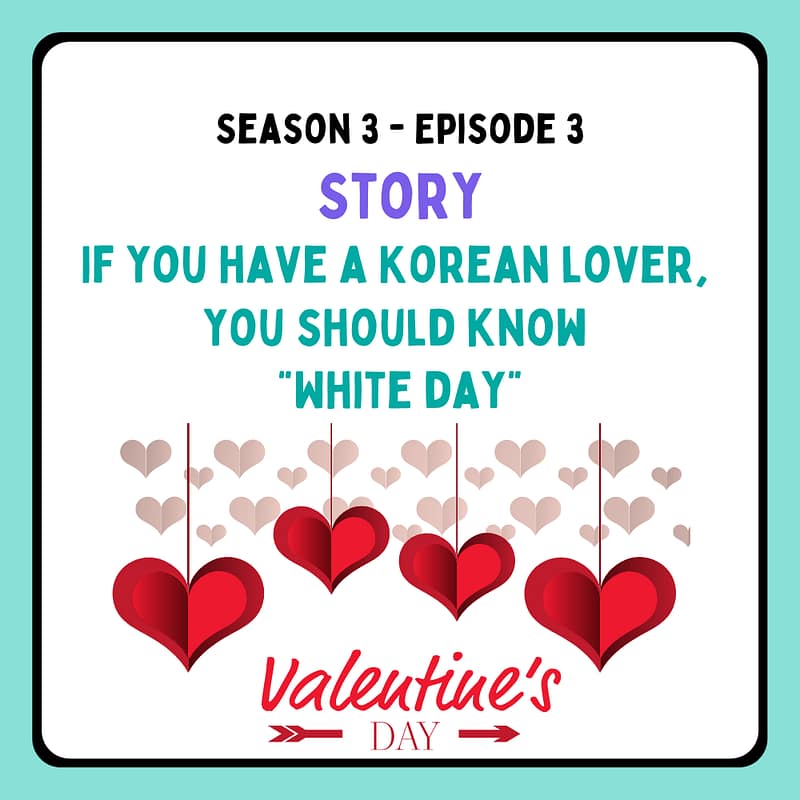Powered by RedCircle
시즌3, 3화. 이야기편 | 한국인 애인이 있으면, 화이트 데이를 알아야 해요.
Season 3, Episode 3 – Story | If you have a Korean lover, you should know “White day.”
안녕하세요? 잘 지냈어요? It’s your host of the Korean study café, Vanessa.
Today we will listen to a story about White day in Korea.
Then Now, shall we listen to the story?
Story
English Translation만약에 한국인 애인이 있으면 화이트 데이를 알아야 해요.
서양 문화에서는 연인들을 위해 발렌타인 데이가 있어요. 하지만 한국에서는 발렌타인 데이와 화이트 데이가 있어요. 사실 조금 개념이 달라요.
서양에서는 2월 14일에 많은 커플들이 로맨틱하게 하루를 함께 보내요. 하지만 한국에서는 2월 14일 발렌타인 데이에 여자들만 남자들에게 선물해요. 보통 초콜릿이나 작은 선물을 줘요. 그리고 만약에 짝사랑을 하고 있으면, 이 날에 여자가 남자에게 고백을 할 수 있어요. 그리고 화이트 데이는 3월 14일이에요. 이 날에는 남자들이 여자들에게 선물해요. 보통 사탕을 선물해요. 물론 다른 선물을 줄 수도 있어요. 하지만 사탕은 화이트 데이의 상징이에요. 이 날도 많은 남자들이 짝사랑하는 여자들에게 고백을 해요.
이렇게 발렌타인 데이와 화이트 데이가 한 달의 시간 차이가 나기 때문에 일부 나쁜 남자 친구들은 발렌타인 데이에 선물을 받고 1-2주 뒤에 헤어지는 경우도 있어요. 이런 사람들은 정말 치사한 것 같아요. 물론 대부분은 그렇지 않아요. 어쨌든 한국에서는 이렇게 한 달 동안 젊은 연인들이 서로의 사랑을 확인해요.
여러분 나라의 발렌타인 데이 문화는 어때요? 기억에 남는 발렌타인 데이 에피소드가 있어요?
If you have a Korean partner, you should know White Day.
In Western culture, Valentine’s Day is celebrated for lovers. But in Korea, there are Valentine’s Day and White Day. The concept is a little different (from Western culture).
In the West, many couples spend a romantic day together on Valentin’s day, February 14. However, in Korea, Valentin’s day, February 14, is celebrated when the women give chocolates or small gifts to the men. Also, if you have a crush or unrequited love, the women can confess their feeling to the men on this day.
The White day is March 14, and on this day, it is the other way around where men give gifts to women. Men usually give candy as a gift, but they can give other gifts as well. However, candy holds the symbol of the White day. On this day, men who have crushes or unrequited love confess their feelings to women.
Because Valentine’s Day and White Day are separated by a month, some awful boyfriends or male-partner receive presents on Valentine’s Day then break up a week or two weeks afterward. Those people are discourteous and shameful. Of course, most don’t do this. Anyway, in Korea, young lovers confirm each other’s love for a month through these days.
How is Valentine’s Day culture in your country? Do you have any memorable Valentine’s Day episodes?
How was it? Were you able to understand the story? Even if you didn’t, it’s totally fine because we will see the meaning together now.
All right, then, let’s break down some useful expressions together.
만약에 한국인 애인이 있으면 화이트 데이를 알아야 해요.
서양 문화에서는 연인들을 위해 발렌타인 데이가 있어요. 하지만 한국에서는 발렌타인 데이와 화이트 데이가 있어요. 사실 조금 개념이 달라요.
This “White day” concept exists in South Korea and many other eastern Asian countries like Japan, Taiwan, Hong Kong, Singapore, etc. On this day, guys who have a lover should give a present or a pack of candies in Korea. This culture is quite important among young people, so if you have a Korean girlfriend or boyfriend, you better know this culture.
Now let’s see a grammar point. 만약에 ~면 is a pattern to say “If ~.” 만약에 can be translated into English like “in case (of).” Also, a verb + 면 means “if + a verb” in Korean. In fact, 만약에 and -면 mean quite similar, so you can only use -면. It makes perfect sense. However, if you put 만약에 at the beginning of the sentence, you put the nuance of supposing a situation. To understand this concept better, let’s hear some examples sentences.
(만약에) 서울 대학교에 가고 싶으면 아주 열심히 공부해야 돼요.
If you want to go to Seoul National University, you have to study very hard.
(만약에) 제 한국어가 더 유창하면 한국 친구들을 많이 사귈 수 있을 것 같아요.
If my Korean is more fluent, I think I can make many Korean friends.
(만약에) 옷 사이즈가 안 맞으면 나중에 환불해도 돼요?
If the clothes don’t fit, can I get a refund later?
Now let’s see the main vocabularies that are used in this part
애인 lover, boyfriend or girlfriend
연인 love, lover, couple
개념 concept
다르다 to be different
서양에서는 2월 14일에 많은 커플들이 로맨틱하게 하루를 함께 보내요. 하지만 한국에서는 2월 14일 발렌타인 데이에 여자들만 남자들에게 선물해요. 보통 초콜릿이나 작은 선물을 줘요. 그리고 만약에 짝사랑을 하고 있으면, 이 날에 여자가 남자에게 고백을 할 수 있어요. 그리고 화이트 데이는 3월 14일이에요. 이 날에는 남자들이 여자들에게 선물해요. 보통 사탕을 선물해요. 물론 다른 선물을 줄 수도 있어요. 하지만 사탕은 화이트 데이의 상징이에요. 이 날도 많은 남자들이 짝사랑하는 여자들에게 고백을 해요.
여러분 나라에서도 발렌타인 데이에 사람들이 초콜릿을 선물해요? Do people gift chocolate on Valentine’s day in your country? 한국에서는 여자들이 남자들에게 초콜릿을 선물해요. Girls gift chocolate to boys in Korea. 그래서 이 날에 여자들은 짝사랑하는 남자에게 초콜릿 선물로 고백을 할 수 있어요. So girls can confess their love to boys who are their crushes with a chocolate gift on this day.
In this part, let’s break down the word 짝사랑 crush, which literally means one-sided love.
짝 is a counting unit of things that makes a pair or a couple. So if you see the word 짝사랑 closely, to make a couple, there should be two people, but there’s only one 짝, which is one person in this case. So 짝사랑 means 짝 one person or one-sided 사랑 love.
Let’s see the words that used this syllable 짝 in this text.
짝꿍 a colleague who can make a couple / it also usually means “very close friend who always seems like a pair.”
짝짝이 a pair that consists of unmatched ones
For example, 아침에 바빠서 신발을 짝짝이로 신고 학교에 갔어요. I was busy this morning, so I went to school wearing unmatched pair of shoes.
짝짓다 to make a pair, two people gather and make a pair
짝짓기 mating (mostly for animals)
See? All of these words starting with 짝 have pair or match-related meanings. So if you remember that, it will help you memorize other related words as well.
All right! Now let’s see the main vocabularies that are used in this part.
로맨틱하다 to be romantic
선물하다 / 선물을 주다 to gift, to give a present
고백하다 to confess one’s love
상징 symbol
Now let’s hear the last part
이렇게 발렌타인 데이와 화이트 데이가 한 달의 시간 차이가 나기 때문에 일부 나쁜 남자 친구들은 발렌타인 데이에 선물을 받고 1-2주 뒤에 헤어지는 경우도 있어요. 이런 사람들은 정말 치사한 것 같아요. 물론 대부분은 그렇지 않아요. 어쨌든 한국에서는 이렇게 한 달 동안 젊은 연인들이 서로의 사랑을 확인해요.
여러분 나라의 발렌타인 데이 문화는 어때요? 기억에 남는 발렌타인 데이 에피소드가 있어요?
In this part, let’s check out the meaning of 치사하다 to be cheap. 치사하다 expression is only used for describing a person’s character or personality. But if you look up this word in a dictionary, you will see many synonyms related to this word.
The common ones are 치사하다, 쪼잔하다, 비겁하다. Let’s see what the differences are among them.
치사하다 is used when describing a person who acts shady, mean, and unpresentable, whereas 쪼잔하다 is used when describing a person who is small-minded, petty, stingy. Also, 비겁하다 is used when describing a person who is nasty, being like a coward.
All of them mean something very similar, right?
Let’s see the example sentences, then you will understand much better.
지난 주에 제가 민지 씨의 숙제를 도와줬는데 민지 씨는 이번 주 제 숙제를 안 도와줬어요. 민지 씨는 정말 치사한 것 같아요.
Last week I helped Minji with her homework, but Minji didn’t help with my homework this week. I think Minji is really discourteous.
발렌타인 데이에 백화점에서 제일 좋은 초콜릿 선물 세트를 남자친구에게 선물했어요. 그런데 화이트 데이에 제 남자친구는 막대사탕 하나를 선물로 줬어요. 제 남자친구 너무 쪼잔한 것 같아요.
On Valentine’s Day, I gave my boyfriend the best chocolate gift set in the department store. But on White Day, my boyfriend gave me a lollipop as a gift. I really think my boyfriend is stingy.
시험 칠때 친구들이 다 컨닝을 했어요. 하지만 저는 안 했어요. 저는 비겁하고 싶지 않았어요.
When I was taking the exam, all my friends cheated. But I didn’t. I didn’t want to be deceitful.
Lastly, let’s see the main vocabularies that are used in this part
차이 difference
일부 some, a part (of), partially
선물을 받다 to receive a gift
헤어지다 to break up
젊은 연인 young couple
확인하다 to check, to affirm, to confirm, to verify




